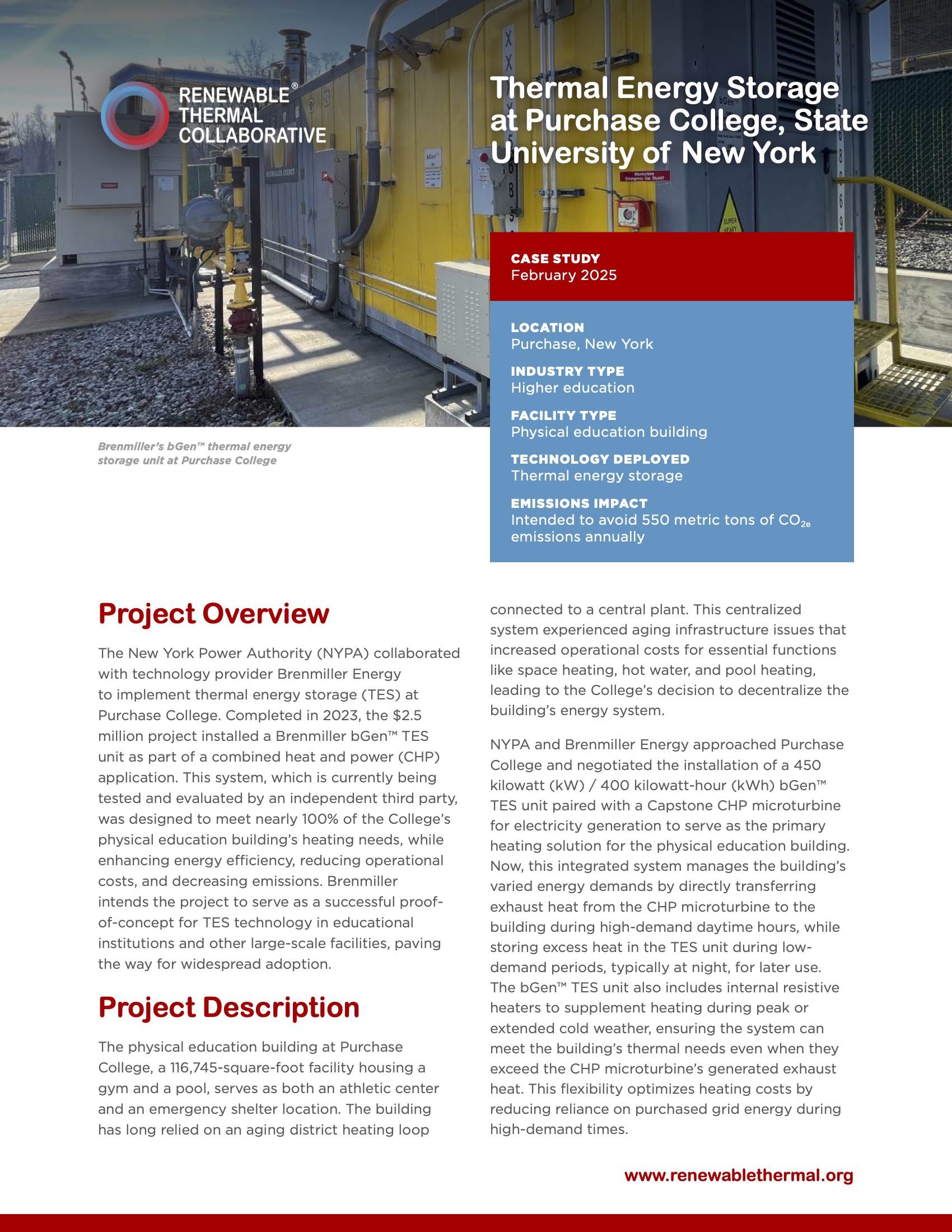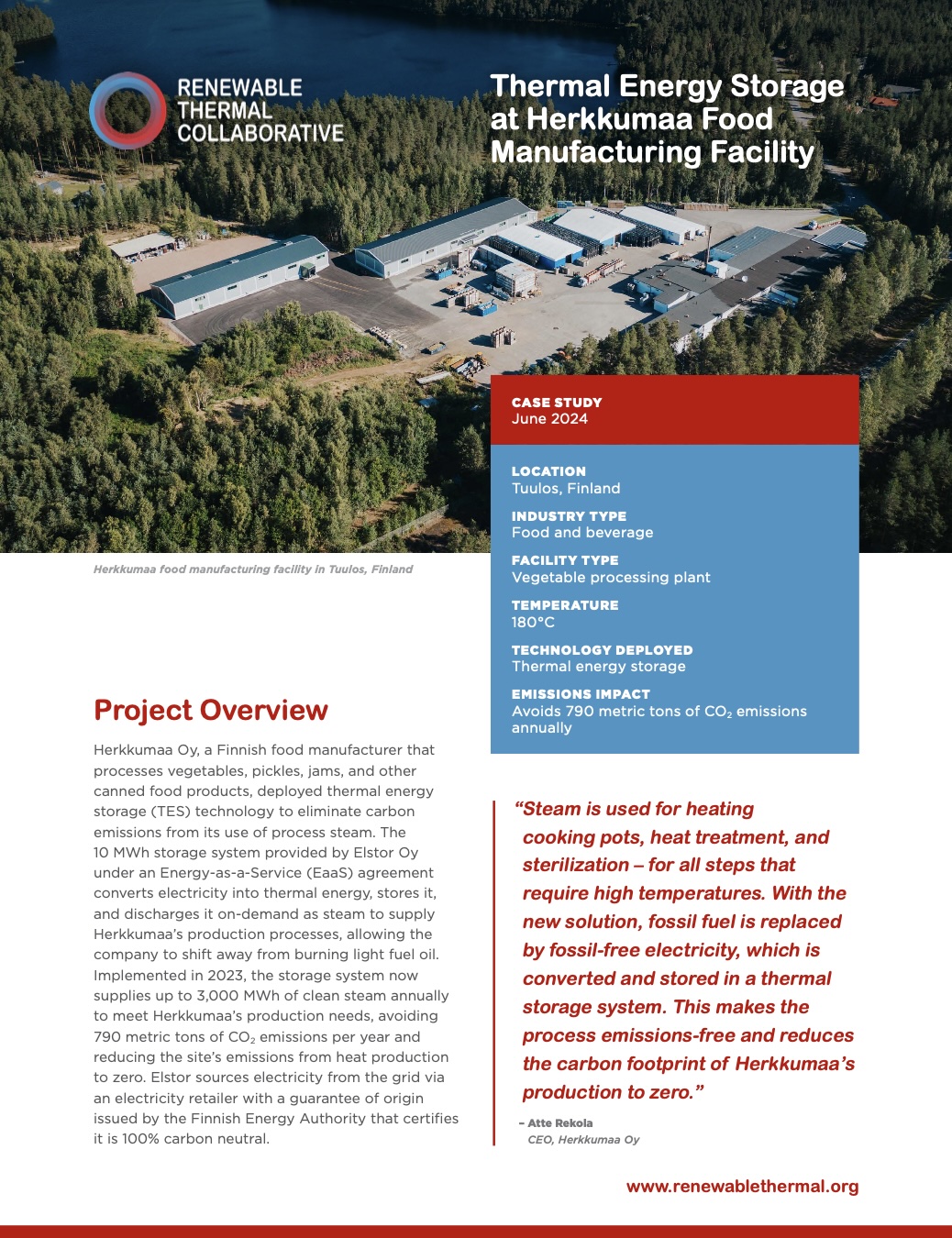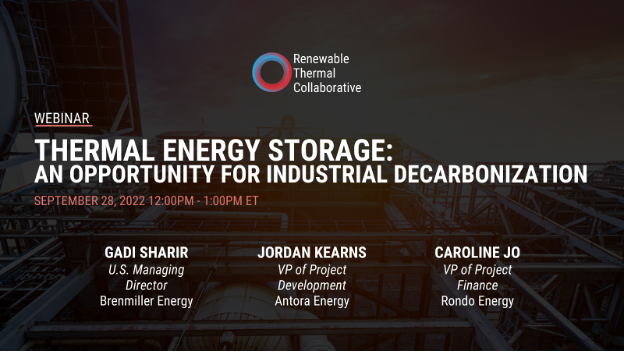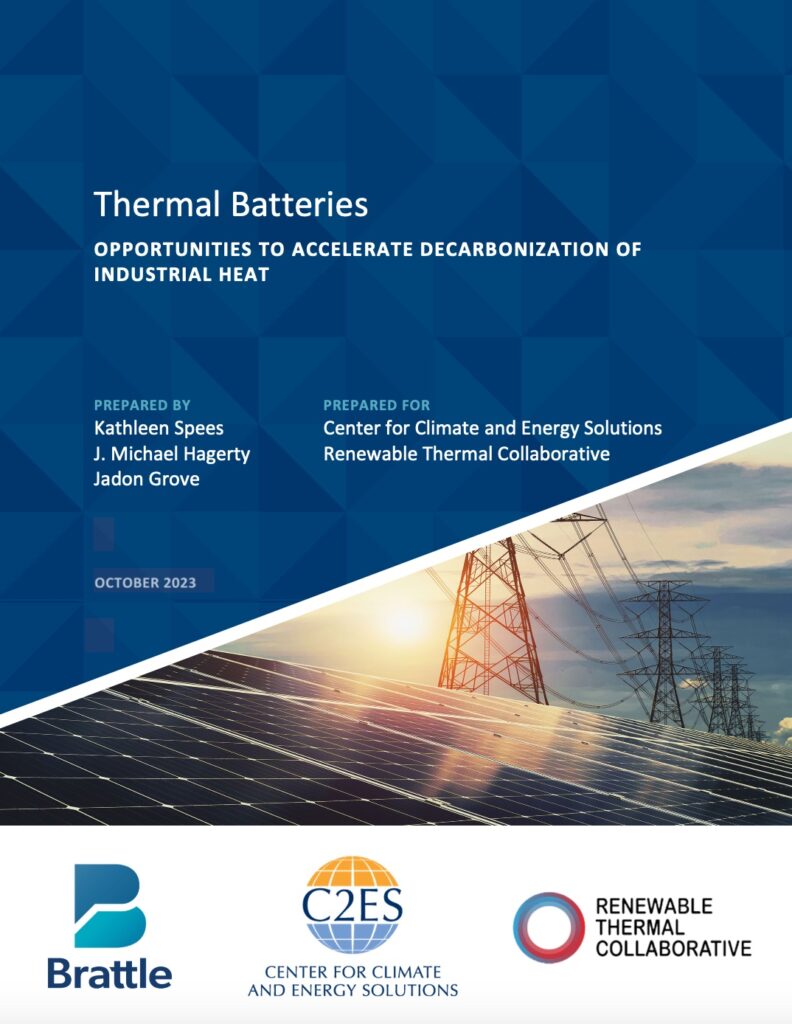Thermal Energy Storage (TES)
Thermal Energy Storage (TES) describes various technologies that temporarily store energy by heating or cooling various storage mediums for later reuse. Sometimes called ‘heat batteries,’ TES technologies work to decouple the availability of heat generated from renewable electricity, solar thermal energy, or even recovered waste heat from when it is actively needed, helping decarbonize industrial processes and the heating or cooling of buildings.
TES is a promising electrification strategy: Because TES can utilize low-cost renewable electricity – for example wind generated in the middle of the night – to produce and store heat for later use, TES provides utility-scale grid storage and helps manage renewables’ intermittency.
Similarly, TES can store heat captured by concentrating solar systems during the day for use during non-daylight hours.
There are various forms of TES technologies that are largely distinguished in terms of the energy sources they draw from, storage mediums they use, and the chemical or physical processes that underlie them. Most commonly, TES technologies store energy in liquids or solids via temperature changes without changing their state of matter. This process often involves converting renewable electricity to heat through common processes such as electrical resistance and storing heat for immediate or later use. Storage mediums include water tanks, molten salt, and materials such as volcanic rock, minerals, ceramic, or concrete. Other forms of TES technologies similarly draw on renewable electricity but store heat via changes in states of matter (e.g. freezing water), often for low-temperature applications in buildings, while other forms of TES technologies work via chemical reactions or by manipulating physical properties of fluids.
TES technologies have strong potential for cross-sectoral decarbonization, especially for heating and cooling buildings and providing heat for industrial processes. TES technologies can provide high temperature industrial heat (above 1,000°C) at extremely high efficiency using common materials that can store heat over long durations. Their cost-effectiveness is expected to further improve over the course of the decade, dropping by about 30 percent for industrial applications by 2030, according to the International Renewable Energy Agency. RTC Solutions Providers have completed multiple agreements for deployments in industrial and institutional settings, including a cement plant, a major plastics company, and a college campus.
What is the RTC Doing?
The RTC convenes a Thermal Storage Working Group comprised of RTC Members and Solutions Providers, utilities, NGOs, and technical experts from research institutions. This working group provided input into the Thermal Storage Technology Assessment and will create a Technology Action Plan and Partnership (TAPP) to identify the market, policy, and technology actions the RTC should take over the next three years to accelerate thermal storage deployment.
Selected materials and webinars
Thermal Batteries: Opportunities to Accelerate Decabonization of Industrial Heating
The RTC assessed the potential of thermal energy storage technology to produce thermal energy for U.S. industry in our report Thermal Batteries: Opportunities to Accelerate Decarbonization of Industrial Heating, prepared by The Brattle Group. Based on modeling and interviews with industrial energy buyers and thermal battery developers, the report finds that electrified thermal batteries can be cost-competitive in much of the U.S. today, and that opportunity will likely grow along with the continued buildout of renewable electricity sources. The report makes recommendations for policymakers and electricity market operators to further unlock the technology by addressing regulatory barriers.
The RTC held a webinar to release the report on October 5, 2023, featuring a presentation from the report’s authors and reactions from energy buyers and Solutions Providers. Watch the webinar recording here.
Case Studies

Purchase College, State University of New York
The New York Power Authority (NYPA) collaborated with Brenmiller Energy to implement TES at Purchase College’s physical education building. Read the case study.

Herkkumaa Food Manufacturing Facility
Herkkumaa Oy, a Finnish food manufacturer, partnered with Elstor Oy to deploy a 10 MWh TES system to decarbonize its steam production. An Energy-as-a-Service model minimizes upfront costs and financial risks while stabilizing energy costs and enabling participation in grid demand response programs. Read the case study.
Advocacy on Section 45X Advanced Manufacturing Production Credit
On December 15, 2023, the U.S. Treasury issued a Notice of Proposed Rulemaking on the Section 45X Advanced Manufacturing Production Credit for the domestic production of certain renewable energy equipment. Following advocacy by the RTC and others, the proposed rules included thermal batteries as eligible property under the credit, underscoring the critical role of thermal energy storage in decarbonizing industrial heat and providing clarity and investment certainty to spur further innovation and deployment. The RTC submitted comments on the proposed rules supporting the inclusion of thermal batteries and advocating for the use of the widely recognized ASME PTC 53 standard for measuring the storage capacity of battery modules.
Webinar: Bringing the Heat for Net Zero Industry
On November 13, the RTC held a webinar with the Long Duration Energy Storage (LDES) Council, the Brattle Group, and Roland Berger to explore how innovations in thermal batteries will pave the road to industrial decarbonization. The webinar walked through findings from our recent report with the Brattle Group that thermal batteries can be cost-competitive decarbonization solutions in the U.S. today but that project viability hinges on how the industrial facility sources renewable electricity. The LDES Council also discussed a new report, created with Roland Berger, evaluating the global market for thermal energy storage and how it can contribute to eliminating emissions across key industrial sectors.

Webinar: Thermal Energy Storage: An Opportunity For Industrial Decarbonization
The RTC hosted a public webinar featuring our three Solutions Providers that provide standalone thermal energy storage: Rondo Energy, Antora Energy, and Brenmiller Energy. These solutions decouple the availability of heat generated from renewable electricity, solar thermal, and other heat sources (such as waste heat) from when end users need it, bringing the decarbonizing of industrial processes and buildings into reach. Participants came away with a better understanding of how these systems work, real-world applications from thermal storage companies, and what the RTC does to support this promising technology. The webinar supported the launch of our Thermal Storage Working Group, open to all our Members and Solutions Providers, which aims to deepen understanding of the technology and to develop a plan to address barriers to its deployment and scaling.

How to get involved:
These work streams are developed with and informed by our Members and Solutions Providers. We regularly convene focus working groups to collaborate on this work. To join us in driving forward renewable thermal technologies, become a Member or Solutions Provider of the RTC here.
Find providers offering thermal energy storage solutions:
Contact:
Ruth Checknoff: ruth@dgardiner.com


